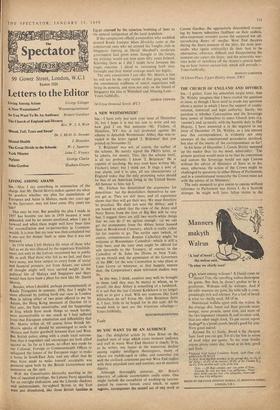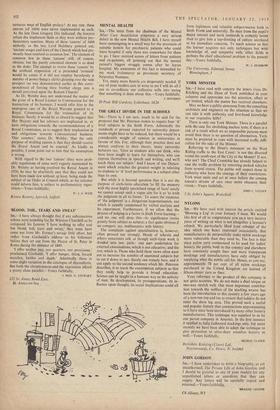THE CHURCH OF ENGLAND AND DIVORCE SIR, — 1 gather, from
his somewhat turgid letter, that Dr. Welsby imagines that I have evaded the question at issue, as though 1 have need to evade any question about a matter in which I have the support of consti- tutional, historical and legal authority. Surely, the question is whether Convocation and the Sovereign have power of themselves to enact Church laws (i.e. 'canons), and, as surely, with my humble duty to Her Majesty, I have answered it in the negative in my letter of December 19. Dr. Welsby, as a late entrant into this correspondence, is evidently not only unaware of the constitutional procedures involved, but also of the merits of the correspondence so far!
In his letter of December 5, Canon Shirley summed up the matter thus (to my mind, admirably): 'The present position would seem to be that by convention and custom the Sovereign would not sign Canons without the advice of Ministers of State so to do; since, otherwise, the action of the Crown might be challenged by questions in either House of Parliament, and in a constitutional monarchy the Crown must act with the advice of its Ministers.'
The only monarch to give assent to canons without reference to Parliament was James I. As a Scottish stranger, he might well have fallen victim to the
tortuous ways of English prelacy! At any rate, these canons (of 1604) were never implemented as such. As the late Dom Gregory Dix indicated, the lawyers refuse dto implement them as they were without par- liamentary sanction. Many of these 'canons' of 1604 embody, as the late Lord Halsbury pointed out, 'ancient usages and laws of the Church which had pre- viously been received as common law.' The element of common law in these 'canons' still, of course, obtains: but the purely canonical element is as dead as the dodo. The attempt to revive these 'canons' by the artificial respiration of a pretended 'revision' would be comic if it did not employ harmlessly a number of power-hungry clerics gloating over the vain prospect (as was demonstrated earlier in this corre- spondence) of forcing their brother clergy into a mould patterned upon the Roman Church!
As Dr. Welsby does not understand the matter of the grant of a Royal Licence to Convocation for the transaction of its business, I would refer him to the analogous case of the Royal Warrant granted to a Royal Commission for the transaction of its business: Surely, it would be as absurd to suggest that Her Majesty and her advisers are implicated in, or have obligations towards, the recommendations of a Royal Commission, as to suggest their implication in and obligations towards Convocational business. `One assumes,' states Dr. Welsby, 'that the only purpose of drafting canons is that they should receive the Royal Assent and be enacted.' As kindly as possible, I must point out to him that his assumption is wrong.
With regard to the two 'canons' (they were prob- ably regulations of some sort) vaguely mentioned by Dr. Welsby as having received the Royal Assent in 1936, he may be absolutely sure that they could not have been made law without, at least, being made the subject of an Order in Council which, as his solicitor could inform him, is subject to parliamentary super- vision.—Yours faithfully,
W. J. S. WEIR Kirton Rectory, Ipswich, Suffolk











































 Previous page
Previous page